Most of us take our food for granted, but to a connoisseur, food not only tastes excellent but becomes a form of art. Food fuels our bodies so we can carry on with our lives. But… it’s even more than that! Good food evokes memories of our childhood. It brings families together through fellowship. And, occasionally, a little food “competition” amongst friends is a good thing, too!
What did Julia have to say about it?
Julia Child, a famous chef, TV personality, and accomplished author said this about French cuisine… “One of the things the French teach us is the beauty of a meal.” Mealtime should be a time in our day that we slow down, savor the taste of every bite, and appreciate the blessings it provides. At the family dinner table, we can reconnect with our family, see what our children are up to, and simply enjoy the time together… without the phones, the dog barking, and the neighborhood kids wondering if little Tommy can come out to play!
Sound too good to be true?
Well, maybe it is in this imperfect world we live in today, but as families, we must at least try! Studies show that fewer and fewer people are in the position to have a family-style dinner nightly; although, most parents and their children would like it very much. In a family setting, parents can provide much guidance about good nutrition, proper manners, and positive communication.
“Cooking well doesn’t mean cooking fancy.” – Julia Child
However, the food industry involves more than just cooking an exceptional dish for your family. There’s a lot of thought and preparation that must go into each and every meal; either for the home cook or the culinary professional. And, as a professional chef or restaurateur, responsibilities such as sales and marketing, cost estimation, financial analysis, and of course, the day-to-day operations of maintaining an establishment are all important skills to learn for success.
Have a particular question? We’ve summed up the Q and A’s with this Quick Link section!
- Are you a home cook looking to improve your skills or would you like to become a professional?
- Do I need an online degree or will a certificate program suffice if I would like to become a professional chef?
- Is it possible to earn a culinary degree online?
- Am I suited for an online culinary program?
- Will I need to supply my own kitchen gadgets for online learning? What will I need?
- How can I learn culinary skills effectively via an online format?
- What will I learn in my culinary classes?
- What about the “Business” side of cooking?
- Can I learn how to be a Pastry Chef or Baker in a Culinary program?
- How will instructors know I’ve done the assignments?
- What about externships?
- Is accreditation that important?
- BEST CULINARY SCHOOLS: Online and On-Campus
Take a look at this:
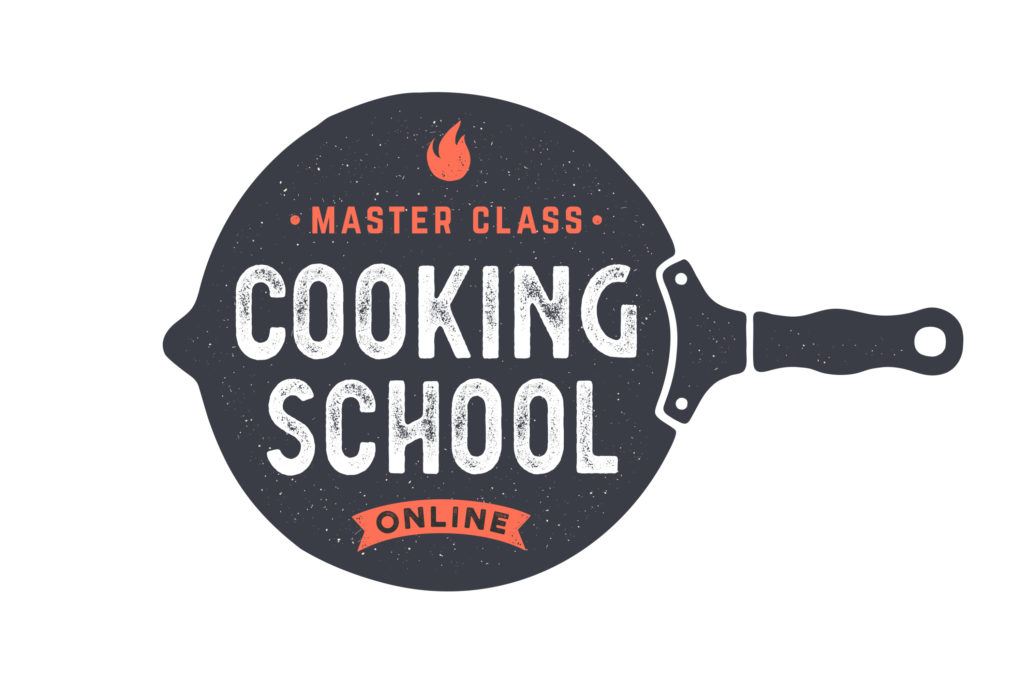
Are you a home cook looking to improve your skills or would you like to become a professional?
If you are thinking about attending a culinary program, without a doubt, you probably have some cooking experience, right? Do you like to get in the kitchen and rustle something up out of what you have in the pantry? Are you the one that is expected to plan, cook, and present an exceptional Thanksgiving feast every year? Do your friends and family love to go to gatherings at your house… because you have the best food spread?
If you answered yes to any of the above questions, a career in the culinary world is perfect for you; whether you would like to become a caterer or someday open your own restaurant. And for the home cook, culinary classes are just as important for you because you are dedicated to serving your family delicious, as well as nutritious, meals.
Do I need an online degree or will a certificate program suffice if I would like to become a professional chef?
To become a renowned Chef, you must earn your way up to the top like everyone else. Often, teenagers get their first job in a restaurant, either bussing tables or as part of the wait staff. From there, perhaps you moved your way up through the ranks to line cook, prep cook, or station cook. Usually, at this point, young adults realize their interest in cooking and are inspired to become an Executive Chef. But not everyone develops an interest in cooking so early. Often, it comes as young parents begin to cook for their children, or your inspiration may be a desire for a career change.
FUN FACT: JULIA CHILD DIDN’T START COOKING UNTIL AGE 32.
At whichever time in your life you decide to become a Chef, you must decide what type of education you need. What will help you achieve your end goal? What will help you obtain the personal satisfaction and confidence you need to pursue your dream?
There are several routes to consider. Here is a look at a few options:
- Certificate Program – Usually takes about a year or less to complete, teaches the basics of cooking, the fundamentals and terminology of cooking, knife skills, recipe conversion and adheres to the professional standards needed to be a Line Cook or other beginner positions within a restaurant.
- Diploma Program – Usually requires 30 or more credits to complete; they also teach the fundamentals plus much more and prepares graduates for careers in the restaurant setting or the hospitality industry. Often the credits can be transferred to an associate degree program.
- Associate Degree – Usually takes two years to complete with 60 or more credits; offers a more comprehensive approach to all types and techniques of cooking, focusing on many of the administrative matters involved with operating a dining establishment as a Food and Beverage Manager or Sous Chef.
- Bachelor’s Degree – This four-year program takes 124 or more credits to complete; is an all-encompassing degree program teaching fundamental, as well as advanced learning cooking techniques, sharpens management skills, emphasizes the importance of good financial and marketing skills, and will prepare the graduate to be a Chef, Restaurant Manager, and more.
- Master’s and Doctoral Degrees are available, as well; however, on-campus attendance most likely will be required.
While becoming a professional Chef can be obtained by any type of program level, hard work, and experience, only you can decide which route is best for you!
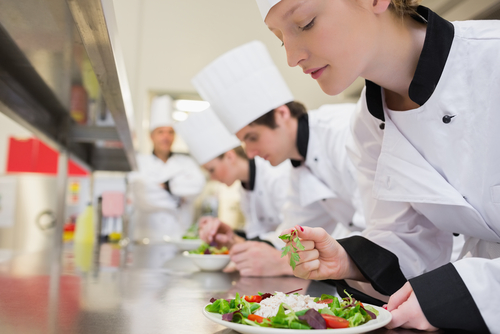
Is it possible to earn a culinary degree online?
If you are interested in the culinary industry, perhaps you’ve wondered if it is possible to earn a degree through an online program. The answer is yes. Online degree programs allow flexibility while working a full-time job to meet other family obligations. Most online programs provide a convenient self-paced learning option to assist you in pursuing a career in the foodservice industry.
At first glance, you may be surprised that you can easily earn credentials through an online program; however, depending on the school, you may earn a certificate, diploma, associate, or a bachelor’s degree.
Am I suited for an online culinary program?
Now, it is true that everyone is NOT cut out for online learning; however, it can be the answer to your dilemma, especially if you are working a full-time job already, you must be home with the kids during the day, or your budget and other time constraints just don’t allow on-campus attendance.
Here are a few tips to help you determine if you are ready for online distance learning:
- You are a self-starter,
- You can manage your time wisely,
- You are a problem-solver; often able to resolve issues on your own without instruction,
- You enjoy taking your time and working at your own pace,
- You are creative… especially in the field of culinary arts; it is very important,
- And, finally, you are passionate about food and fellowship!
Will I need to supply my own kitchen gadgets for online learning? What will I need?
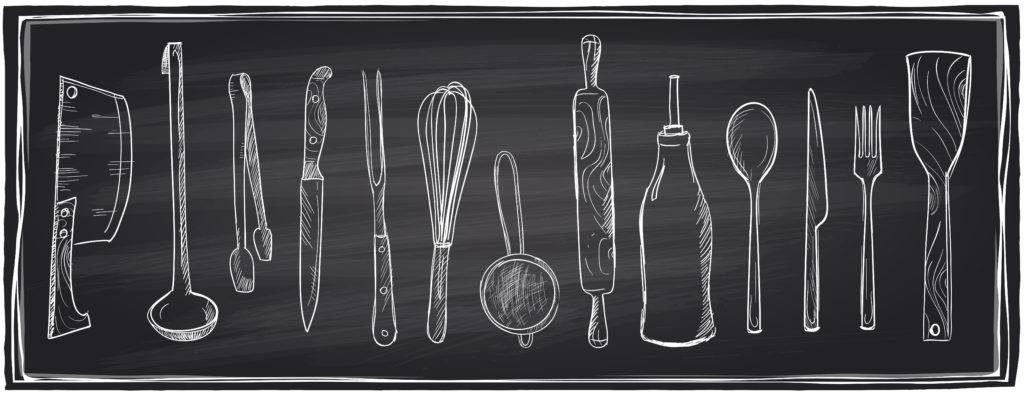
As a student you are expected to provide your own learning materials as a distance learner. Most students need a computer, pen and paper perhaps; however, with a culinary class, you will need “extra” utensils… and not the writing kind! You will need to supply your own kitchen gadgets, pots and pans, and dinnerware for the ultimate presentation.
What should you invest in to begin? Depending on the level you are at, you may want to just begin with the basics at first so you can see “if cooking is for you.” Also, if you are an experienced home cook, you probably already have most of the essentials in your cooking arsenal. Here are a few necessities:
- Knives: Chef’s, Paring, and Serrated
- Measuring Cups and Spoons
- Mixing Bowls; various sizes
- Cutting Boards
- Meat Thermometer
- Colander
- Can Opener
- Spatulas, Tongs, Spoons, Whisk, Vegetable Peeler
- Mandoline Slicer
- Sauce Pans and Skillets; various sizes
- Baking Sheet Pans
And, a few luxuries might come in handy as well, such as:
- Electric Mixer
- Blender
- Food Processor
- Electric Chopper
Remember, only the basics will be used at first. Then, you can work your way up to other tools as your techniques progress. Oh, yes, you will also need to supply your own ingredients!
“I think every woman should have a blowtorch.” – Julia Child
How can I learn culinary skills effectively via an online format?
At-home instructions are given to students through assignments that can be completed when it is convenient for them. Most classes begin with the comprehension of reading materials, as well as instructional videos. This gives you time to familiarize yourself with the methods and terminology of the subject.
Topics such as knife skills can be learned by observing and then practicing the techniques at your own pace. In some instances, practical demonstrations can also be accessed through live webcam sessions or recorded videos that students can then follow along with at home.
As with online classes on any subject, most offer an online learning system to assist you in accessing your coursework and materials at any time, from anywhere you have Internet capabilities. Through this format, you can participate in online discussions with your instructors and fellow classmates. You can submit your assignments and watch instructional videos any time you please.
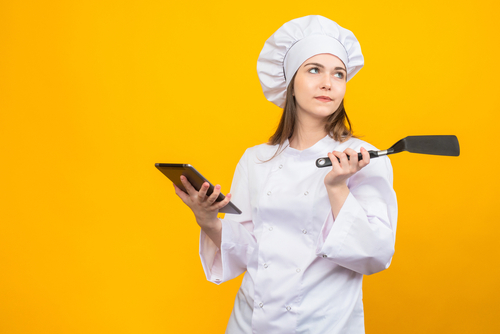
What will I learn in my culinary classes?
How exciting it is to begin a culinary distance learning program! As a homecook, you probably are aware of the types of cooking methods to use; however, through a culinary program, you will expand on your existing knowledge or, if you are a novice beginner, you can even learn how to boil water. The point is… at any skill level you are, you can become an excellent chef!
The various cooking coursework in your particular program choice may offer a wide array of instruction; however, some of the basics include theoretical culinary concepts and terminology, kitchen math, basic and accelerated kitchen operations, knife skills, dietetics and nutrition, food purchasing, food and beverage operations management, food science, and menu analysis.
Other skills learned include cooking techniques to prepare sauces, meats, pasta, as well as preparing stocks, soups and vegetables. You can also expect to learn about food culture, how to make a pleasing food presentation, and how to get creative! You will learn the “tried and true” cooking methods, as well as the most used innovative techniques available today in the culinary world!
What about the “Business” side of cooking?
Yes, a comprehensive culinary school will include administrative classes on how to estimate food and beverage costs, how to maximize profits, advertising, and how to handle the financial responsibilities of running your own catering business or restaurant. Will you need to know how to handle personnel? You bet! Classes that teach you how to be a good communicator, instructor, and manager will be key to your success, no doubt.
Can I learn how to be a Pastry Chef or Baker in a Culinary program?
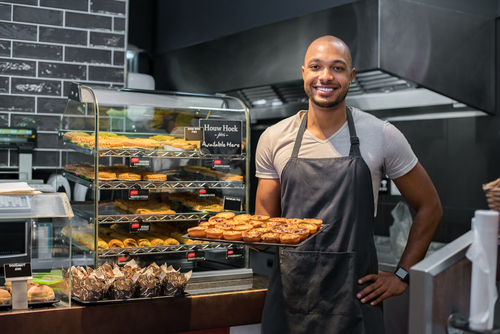
Your degree program may touch on the “sweet tooth” preparations; however, for the most part, culinary schools focus only on the main savory dishes and the like. If you would like to sharpen your pastry or baking skills, there are dedicated schools for just that.
If you are interested in an online pastry or baking course program, check out the Augusta Escoffier Pastry Program.
How will instructors know I’ve done the assignments?
Perhaps learning by tasting your own creations is the best lesson one can appreciate. Through self-assessment exercises, you will be required to prepare a recipe at home, in the convenience of your own kitchen, and then evaluate it based on a checklist of components that adhere to the school’s requirements.
In addition, you will most likely be expected to carefully document your process, along with submitting photos of your finished masterpiece! You must assess and judge your own cooking skills by considering taste, texture, smell, consistency, and of course, it must be aesthetically pleasing to the eye.
What about externships?
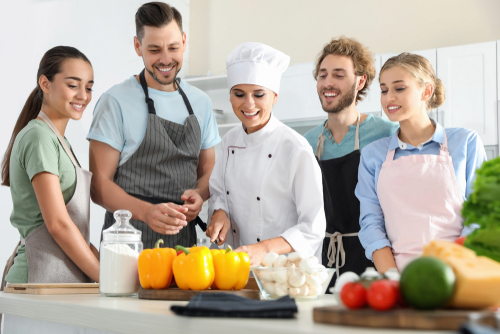
As we all know, hands-on experience is what helps us learn and develop our skills the best, and perhaps the quickest. We tend to learn by doing; therefore, most online programs require an externship. An externship is a temporary training program in a workplace, especially one offered to students as part of a course of study. You will be expected to put your newfound skills to good use!
You can find approved local externship opportunities, usually through your online school’s recommendations. Externship programs provide excellent experience opportunities that are very important to the culinary student and a chance to work with true professionals and mentors that are outstanding in their field of work.
Is accreditation that important?
When considering an online Culinary Arts degree program, please check for proper accreditation. Be sure to verify that the curriculum and externship opportunities meet your desired goals, as well as food safety regulations. In addition, it is also recommended that you check the faculty’s references. Check out the Accrediting Commission of the American Culinary Federation Education Foundation for more information. Check out the Distance Education Accrediting Commission for more information on online learning.
Best Culinary Schools: Online and On-Campus
If you are interested in a career in the food industry, please check out our list of America’s Top Online Culinary Schools.
Would you rather attend culinary school on-campus? If so, check out these options: Top 20 On-Campus Schools for Culinary Programs.
Have more culinary questions? We have more answers!
- What kind of career and salary can I expect in the culinary field?
- What important qualities do I need to be successful in the culinary field?
- What are the educational requirements for a career in the Culinary Arts?
- What should I look for in a school when pursuing a degree in the culinary arts?